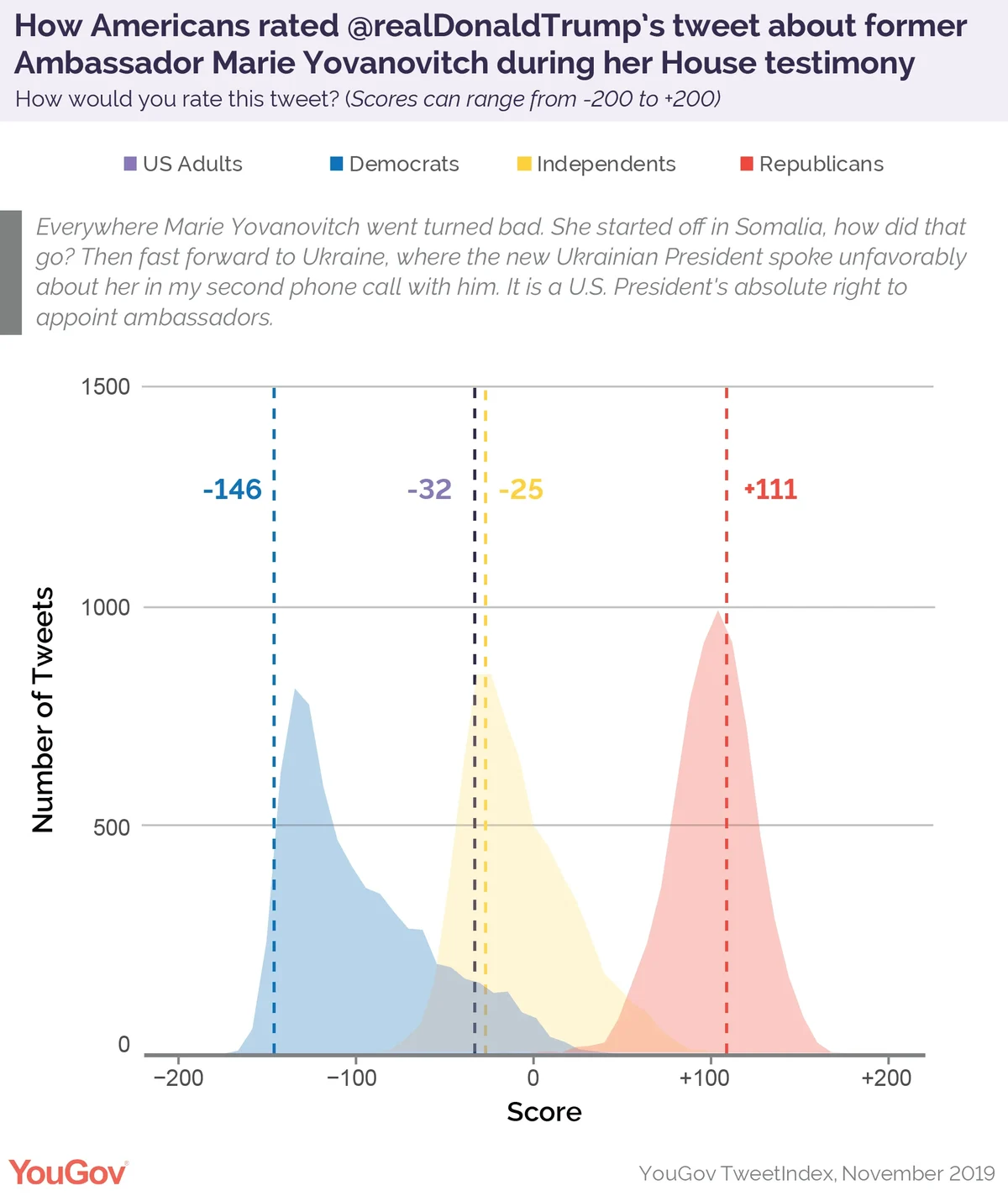On Friday, President Donald Trump used Twitter to attack the former US Ambassador to Ukraine, Marie Yovanovitch, as she testified to the House Intelligence Committee about smear campaign that preluded her dismissal. Hers was the third in a series of public hearings aimed at determining whether Trump committed impeachable offenses in pushing the President of Ukraine to investigate his political rival, Joe Biden.
In the middle of the hearing, the chair of the House Intelligence Committee, Adam Schiff, asked Yovanovitch to respond in real-time to Trump’s tweet.
Trump wrote, “Everywhere Marie Yovanovitch went turned bad. She started off in Somalia, how did that go? Then fast forward to Ukraine, where the new Ukrainian President spoke unfavorably about her in my second phone call with him. It is a U.S. President’s absolute right to appoint ambassadors.....They call it 'serving at the pleasure of the President.' The U.S. now has a very strong and powerful foreign policy, much different than proceeding administrations. It is called, quite simply, America First! With all of that, however, I have done FAR more for Ukraine than O.”
Schiff read the tweet aloud and asked Yovanovitch what the effect she thought it would have on other witnesses’ willingness to come forward. Yovanovitch testified that “It’s very intimidating. “I can’t speak to what the president is trying to do, but the effect is to be intimidating.”
Schiff responded that he and the committee “take witness intimidation very, very seriously.“ In a statement, the White House said the tweet was not witness intimidation, but rather, “simply the president’s opinion, which he is entitled to.”
While Yovanovitch considered the tweet intimidating, Americans did not find it significantly more negative or positive than Trump’s other Twitter missives. Most Americans’ who rated the tweet considered it slightly below the median score that represents whether the tweet is seen as “Great” or “Terrible.” The exception to that is Republicans, who considered the tweet slightly above their median score.
These scores are sourced from regular Americans who consider themselves affiliated with a political party. Every day, YouGov asks a nationally representative sample of US adults to rate the president's tweets on a five-point scale from Great (+2) to Terrible (-2), which produces an overall score for how the general population feels about the tweet on a scale from -200 (if everyone thinks it is terrible) to +200 (if everyone thinks it is great).

Democrats rated the tweet -146, which is 31-points below their median score (-115) for all tweets from President Trump’s Twitter account since the beginning months of his presidency. Republicans rated the tweet 9-points above their median score (+102), giving the tweet a score of +111. Independents rated the tweet a -25, which is 9-points below their median score (-16).
More than half (54%) of Republicans rated the tweet “Great,” the highest classification for a Trump tweet. In contrast, seven in ten (71%) Democrats and three in ten (30%) Independents rated the tweet as “Terrible,” the lowest possible score. About two in ten (19%) Independents thought the tweet was “Great.”
Related: How did Trump’s tweets affect Sean Spicer on Dancing with the Stars?
Methodology: YouGov TweetIndex shows how the public rate each tweet from President Donald Trump’s official Twitter account. At the end of every day, YouGov shows a representative sample of US adults the tweets sent in the past 24 hours by President Trump. The panelists are asked to rate the posts on a scale Great (+2), Good (+1), OK (0), Bad (-1), and Terrible (-2). Theoretically, scores can range from -200 (if everyone thought the tweet was “Terrible”) to +200 (if everyone thought the tweet was “Great”).
Image: Getty







